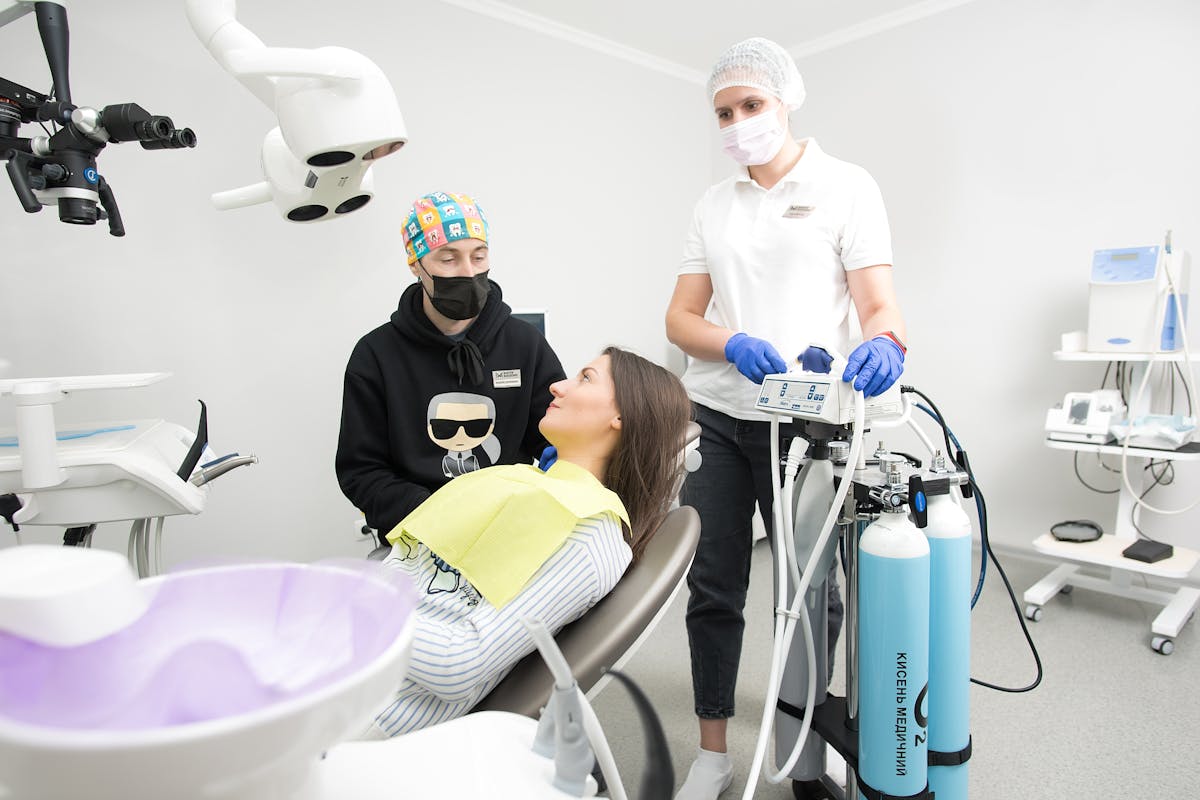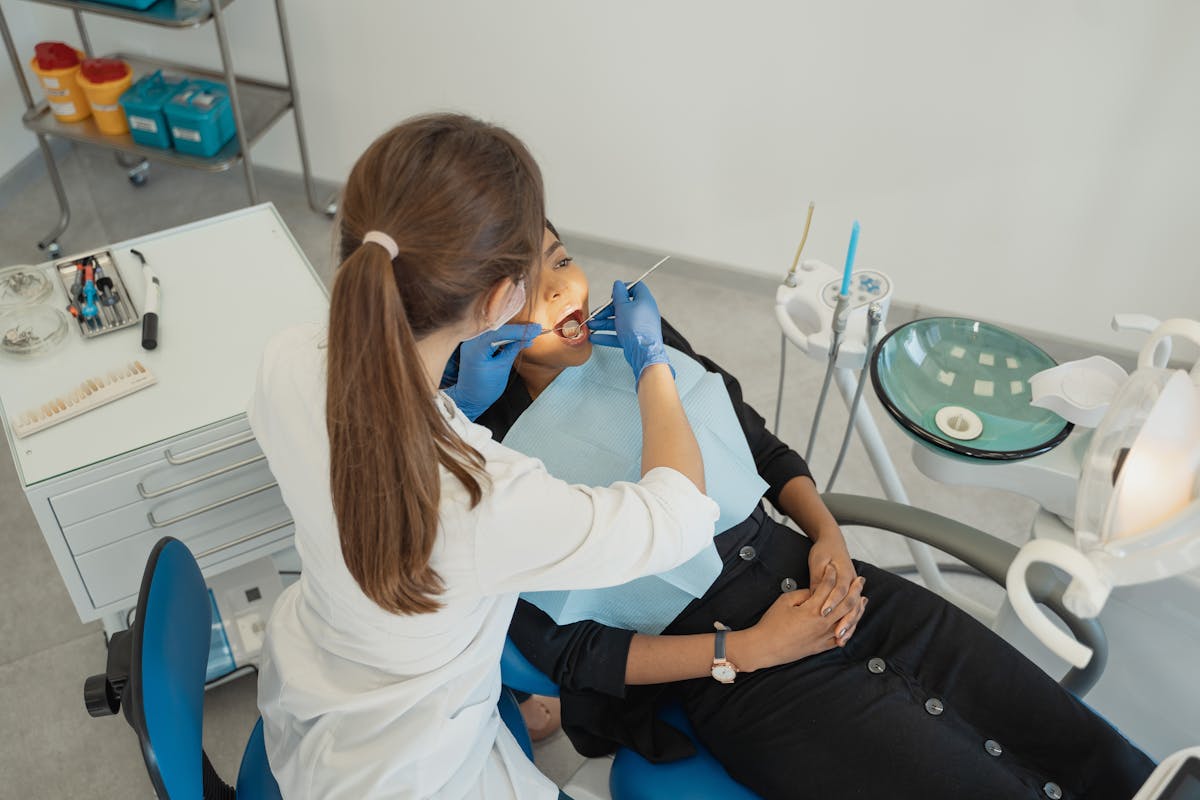Understanding the Role of a Pediatric Dentist
Although many might assume that all dentists perform similar functions, the role of a pediatric dentist is distinct and essential for the dental health of children. Pediatric dentists possess specialized qualifications, including advanced education in child psychology, growth, and development, enabling them to address the unique dental needs of infants through adolescents. Their expertise is critical in managing young patients’ dental anxiety, employing strategies such as child-friendly communication, sedation options, and creating a welcoming environment. These approaches help guarantee a positive dental experience, fostering lifelong oral health habits. Pediatric dentists’ qualifications equip them to handle various developmental stages and specific conditions, guaranteeing thorough care. Their tailored methods set them apart from general dentists, emphasizing the unique demands of pediatric oral health care.




The Importance of Early Dental Visits
Early dental visits play an essential role in establishing healthy oral habits that can last a lifetime. They provide an opportunity to prevent future dental issues by identifying potential problems at an early stage. Additionally, these visits help children build comfort with dentists, reducing anxiety and fostering positive attitudes toward oral health care.
Establishing Healthy Oral Habits
Introducing children to the dentist at an early age plays an essential role in establishing lifelong healthy oral habits. Early visits help demystify the dental environment, making children more comfortable with oral care. Incorporating fun elements like the tooth fairy can transform dental visits from a chore into an engaging experience, reinforcing positive attitudes toward oral hygiene. Additionally, dental games can serve as educational tools, teaching children the importance of brushing and flossing through interactive play. These activities not only foster a sense of responsibility but also make oral health a part of their daily routine. By integrating these strategies, caregivers can guarantee that children develop a foundation of healthy habits, promoting oral well-being for years to come.
Preventing Future Dental Issues
Establishing healthy oral habits in childhood is just the beginning of a lifelong commitment to dental health. Early dental visits play an essential role in preventing future dental issues by introducing children to important dental education resources. These resources empower parents and children with the knowledge needed to maintain ideal oral hygiene. Preventive care strategies, such as routine cleanings and fluoride treatments, are vital in safeguarding against cavities and gum diseases. Regular check-ups allow dentists to monitor developing teeth and identify potential concerns before they escalate. By prioritizing early visits, families can create a foundation for dental wellness that extends into adulthood. These proactive measures reduce the risk of complex dental procedures later in life, ensuring healthier smiles for future generations.
Building Comfort With Dentists
While many children may initially feel apprehensive about visiting the dentist, fostering comfort with dental care from a young age can greatly ease these anxieties. Early dental visits play a vital role in reducing dental anxiety, which can lead to healthier long-term oral hygiene habits. By familiarizing children with the dental environment early, they become more comfortable and less fearful of dental procedures.
Positive reinforcement is an effective strategy in this process. Dentists and parents can praise and reward children for their cooperation during visits, reinforcing the idea that dental care is a positive experience. Additionally, creating a welcoming and friendly atmosphere in dental offices helps children associate visits with a sense of safety and familiarity, further diminishing their anxiety over time.
Common Pediatric Dental Procedures
Pediatric dental procedures form an essential part of maintaining children’s oral health and ensuring their teeth develop properly. Among the most common procedures are sealant application and fluoride treatments, both of which play critical roles in preventing tooth decay. Sealant application involves coating the chewing surfaces of molars with a protective layer to prevent food particles and bacteria from settling into grooves and causing cavities. This procedure is particularly effective for school-aged children and greatly reduces the risk of decay. Fluoride treatments, on the other hand, strengthen tooth enamel and make it more resistant to acid attacks from bacteria in the mouth. These treatments are typically quick, non-invasive, and provide substantial benefits in reinforcing children’s developing teeth against decay.
Managing Teething and Oral Habits
In addition to routine procedures like sealants and fluoride treatments, addressing teething and oral habits is another crucial component of pediatric dental care. Teething symptoms such as irritability, drooling, and gum swelling are common in infants and require careful attention. Parents can employ soothing techniques like gently massaging the gums or providing a chilled teething ring to alleviate discomfort. Furthermore, establishing healthy oral habits early on is essential. This includes discouraging prolonged thumb sucking and pacifier use, as these can affect dental alignment. Pediatric dentists often advise on the appropriate age to phase out these habits to prevent future orthodontic issues. Overall, managing teething and oral habits is important for ensuring healthy dental development in children, setting a foundation for lifelong oral health.
Preventing and Treating Cavities in Baby Teeth
Establishing early oral hygiene practices plays an essential role in preventing cavities in baby teeth. Parents are encouraged to use effective brushing techniques and consider the nutritional impact of diet on dental health. By fostering these habits early, the risk of cavities can be considerably reduced, promoting healthier dental outcomes for children.
Importance of Early Hygiene
Although often overlooked, early dental hygiene is essential for preventing and treating cavities in baby teeth. Establishing good oral habits from a young age sets the foundation for a lifetime of healthy teeth. Early dental education plays an important role in helping parents understand the importance of maintaining their children’s oral hygiene. Educating caregivers about proper brushing and flossing techniques, as well as the importance of routine dental check-ups, can greatly reduce the risk of cavities. Baby teeth, though temporary, are critical for proper speech development, nutrition, and alignment of permanent teeth. By prioritizing children’s oral hygiene early on, parents can prevent painful dental issues and foster positive attitudes towards dental care, ultimately promoting better oral health throughout their children’s lives.
Effective Brushing Techniques
Many parents may not realize the impact that effective brushing techniques can have on preventing and treating cavities in baby teeth. Proper brushing is essential, as it helps remove plaque and food particles that could lead to decay. Using children’s toothbrushes with soft bristles is recommended to protect delicate gums while guaranteeing thorough cleaning. Parents should guide their children to brush twice daily, covering all tooth surfaces with gentle, circular motions. It is critical to emphasize reaching the back molars and along the gum line, areas prone to cavity formation. Regularly replacing children’s toothbrushes every three to four months guarantees peak effectiveness. Teaching young children these brushing techniques not only contributes to oral health but also instills lifelong dental habits.
Nutritional Impact on Teeth
While effective brushing techniques are essential for maintaining dental health in children, nutrition plays an equally important role in preventing and treating cavities in baby teeth. Dietary choices notably impact enamel strength and health. High sugar intake fosters harmful mouth bacteria, accelerating tooth decay. Educating parents and children about nutrition helps form healthy food habits that support dental well-being. Calcium sources, such as dairy products and leafy greens, fortify enamel and contribute to stronger teeth. Offering snack options like fruits, vegetables, and nuts can reduce cavity risks compared to sugary treats. Reinforcing the importance of balanced meals and limiting sugary beverages is vital in dental care education. Ultimately, informed dietary decisions can effectively complement oral hygiene practices in preserving children’s dental health.
Creating a Positive Dental Experience for Children
Ensuring children have a positive dental experience is vital in fostering lifelong oral health habits. Creating a playful atmosphere in dental clinics can greatly influence a child’s perception of dental visits. Brightly colored walls, fun decorations, and engaging toys help cultivate a welcoming environment. Additionally, interactive tools such as visual aids and child-friendly dental instruments can demystify procedures, reducing anxiety. These tools not only educate but also entertain, making the visit more enjoyable for young patients. Dentists and staff trained in pediatric care play an important role by employing gentle communication techniques and demonstrating empathy. This approach builds trust and helps children associate dental visits with positive experiences, ultimately encouraging regular check-ups and instilling a foundation for good oral hygiene practices.
Tips for Parents to Support Children’s Oral Health
To support their children’s oral health, parents should establish a consistent dental care routine at home. This includes brushing teeth twice daily with fluoride toothpaste and flossing regularly to prevent cavities and promote strong teeth. Parents are encouraged to model positive oral care habits, thereby reducing any dental fears children may develop.
Regular dental check-ups are essential in monitoring children’s oral health and addressing potential issues early. Parents can alleviate dental fears by discussing upcoming visits in a positive light and reading children books that portray dental visits as a fun experience. Limiting sugary snacks and drinks also plays a significant role in maintaining oral health. By setting a strong foundation, parents can help their children cultivate lifelong healthy dental habits.
Visit Us Today
Let OraCare Dental Centre be your partner in lifelong oral health. Whether it’s your first visit or your fiftieth, we’re here to make your dental experience exceptional.
